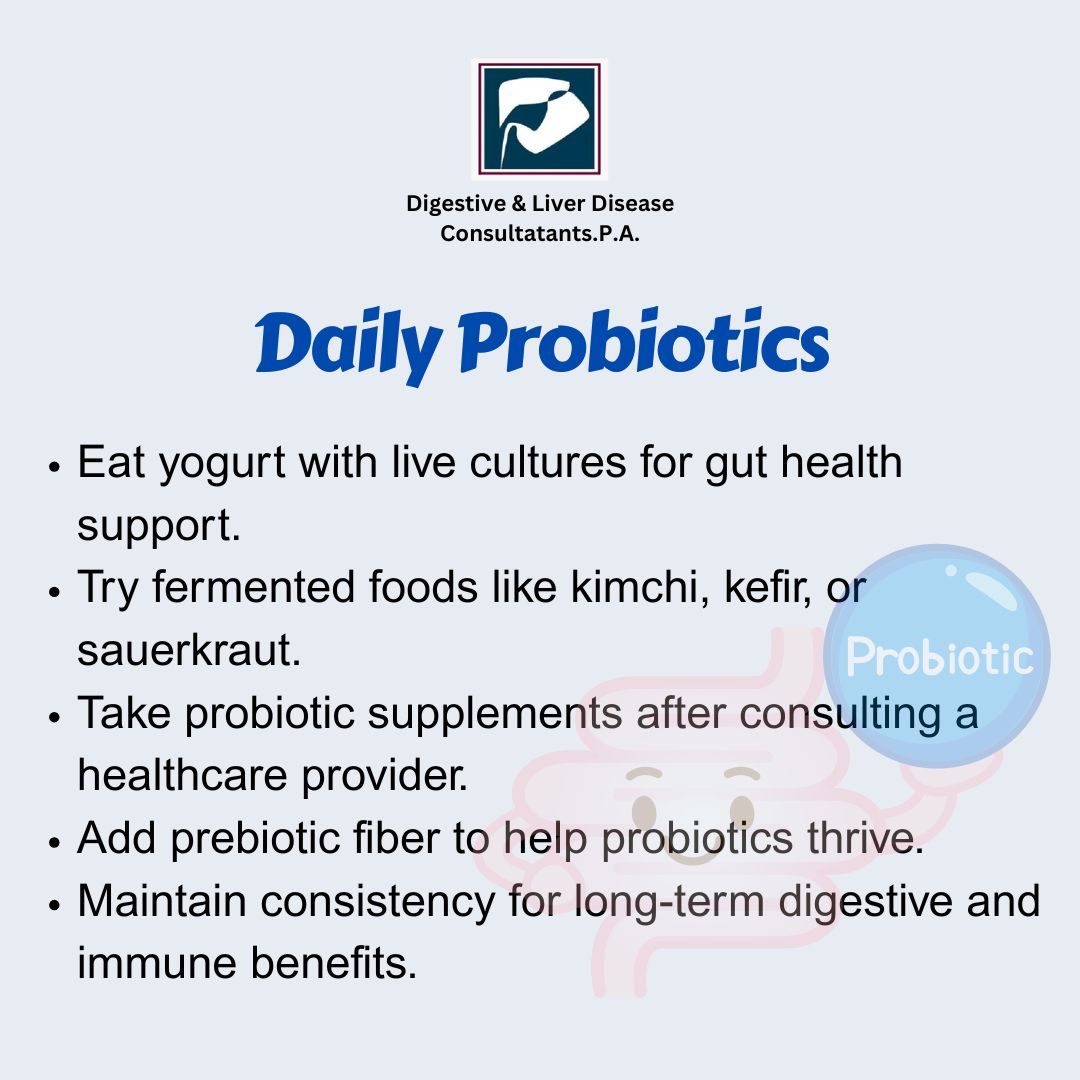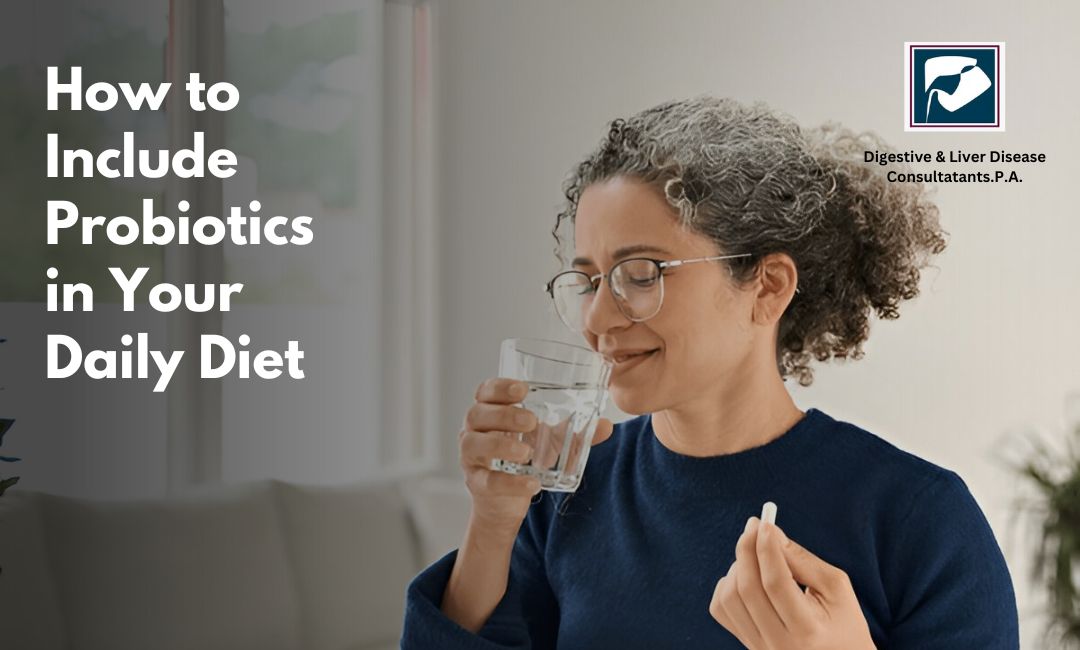Probiotics, often called “good bacteria,” are live microorganisms that provide numerous health benefits when consumed in adequate amounts. They are essential for maintaining a healthy balance of gut bacteria, which can improve digestion, boost immunity, and even enhance your overall well-being. At Digestive & Liver Disease Consultants, P.A., we understand the importance of gut health and how probiotics can support digestive functions. In this blog, we will explore simple and effective ways to incorporate probiotics into your daily diet and how they contribute to a healthier digestive system.
What Are Probiotics and Why Are They Important?
Probiotics are beneficial bacteria that naturally occur in your gut and help maintain a healthy balance of microorganisms. A well-balanced microbiome (the community of bacteria and other microbes in your gut) is crucial for proper digestion, immune function, and even mental health.
When your gut microbiome becomes imbalanced—due to factors like poor diet, stress, illness, or antibiotics—it can lead to digestive issues such as bloating, diarrhea, constipation, and even more serious conditions like irritable bowel syndrome (IBS) or inflammatory bowel disease (IBD). Incorporating probiotics into your diet can help restore this balance and promote optimal digestive health.

Health Benefits of Probiotics
Before diving into how to add probiotics to your daily diet, it’s helpful to understand the many health benefits they offer, including:
Improved Digestion: Probiotics help break down food and absorb nutrients, supporting overall digestive health. They can also reduce symptoms of bloating, gas, and diarrhea, especially in people with IBS.
Stronger Immune System: A significant portion of your immune system resides in the gut. By maintaining a healthy gut flora, probiotics help bolster your immune response and reduce the risk of infections.
Mental Health Support: Recent studies suggest a connection between gut health and mental health. Probiotics may play a role in reducing symptoms of anxiety and depression by promoting a balanced gut microbiome.
Enhanced Nutrient Absorption: Probiotics help your body absorb essential vitamins and minerals like calcium, magnesium, and B vitamins, which are crucial for overall health.
Best Foods to Include Probiotics in Your Daily Diet
The best way to get probiotics is through food, as these natural sources are rich in live cultures. Here are some delicious and easy ways to incorporate probiotics into your daily meals:
1. Yogurt
Yogurt is one of the most popular and accessible sources of probiotics. It is made by fermenting milk with beneficial bacteria, such as Lactobacillus and Bifidobacterium species. When choosing yogurt, make sure to opt for plain, unsweetened varieties that contain live and active cultures. You can enjoy yogurt on its own or add it to smoothies, parfaits, or as a topping for fruit and granola.
2. Kefir
Kefir is a fermented milk drink that’s similar to yogurt but contains a wider variety of probiotic strains. It is known for its creamy texture and tangy taste. Kefir is versatile and can be enjoyed on its own or added to smoothies, cereals, or salad dressings.
3. Sauerkraut and Kimchi
Both sauerkraut (fermented cabbage) and kimchi (a Korean dish made from fermented vegetables) are excellent sources of probiotics. They are not only rich in beneficial bacteria but also packed with fiber and antioxidants. Adding a small serving of sauerkraut or kimchi to your meals is an easy way to incorporate probiotics into your diet. They pair well with meats, sandwiches, or salads.
4. Miso
Miso is a fermented paste made from soybeans, rice, or barley and is often used in soups, sauces, and dressings. Miso is an excellent source of probiotics and can add a savory, umami flavor to your dishes. You can enjoy miso in traditional Japanese soups or mix it into sauces, stir-fries, or even roasted vegetables.
5. Pickles (Fermented Vegetables)
Pickled vegetables, such as cucumbers, carrots, and beets, are another good source of probiotics, but they must be naturally fermented, not the vinegar-based pickles you find in most supermarkets. Fermented pickles contain beneficial bacteria that can improve your gut health. These can be enjoyed as a snack, added to salads, or used as a topping for sandwiches and burgers.
6. Tempeh
Tempeh is a fermented soybean product, often used as a meat substitute in plant-based diets. It is rich in protein, fiber, and probiotics. You can use tempeh in stir-fries, salads, sandwiches, or even as a topping for bowls.
7. Fermented Cheeses
Some types of cheese, such as gouda, cheddar, and Swiss, contain live cultures that promote gut health. Choose cheeses that are made from raw milk or those labeled with “live cultures” to ensure that they contain probiotics. Enjoy these cheeses as snacks, in sandwiches, or as part of a cheese board.
8. Probiotic Supplements
While food sources are the best way to consume probiotics, probiotic supplements are also available for those who may not be able to get enough through diet alone. These supplements come in various forms, such as capsules, tablets, or powders, and can be a convenient way to ensure you’re getting adequate amounts of probiotics.
Tips for Adding Probiotics to Your Daily Diet
Start Slowly: If you’re new to probiotics, it’s best to start slowly to avoid any potential digestive discomfort, such as gas or bloating. Gradually increase the amount of probiotic-rich foods in your diet over time.
Choose Variety: Different probiotic strains offer different health benefits. By incorporating a variety of probiotic-rich foods into your diet, you can ensure you’re supporting your gut health from all angles.
Be Consistent: Probiotics work best when consumed regularly. Make it a habit to include probiotic foods in your meals each day for optimal benefits.
Pair with Prebiotics: Prebiotics are non-digestible fibers found in foods like garlic, onions, bananas, and asparagus that help feed and nourish probiotics. Including both prebiotics and probiotics in your diet ensures a balanced and thriving gut microbiome.
Conclusion
Incorporating probiotics into your daily diet is an effective way to support digestive health, improve immune function, and enhance overall well-being. Whether through yogurt, kefir, miso, or fermented vegetables, there are plenty of delicious and easy ways to include these beneficial bacteria in your meals.
At Digestive & Liver Disease Consultants, P.A., we’re dedicated to your digestive health. If you have digestive concerns or questions about probiotics and gut health, our expert team is here to help!






